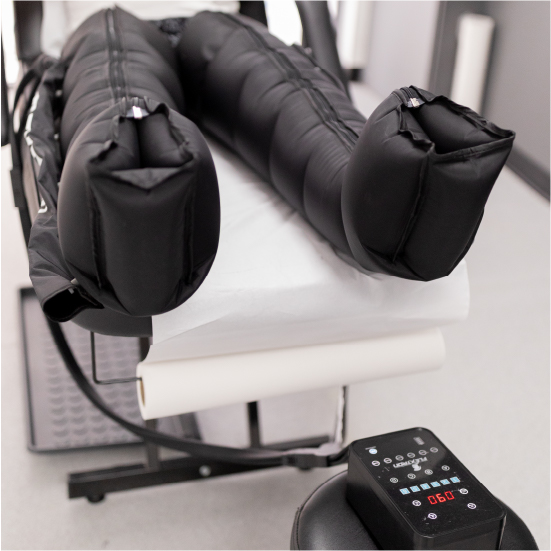

Compression Therapy Boots
The compression boots are connected to a machine that pumps air into the sleeves which are worn over the legs. These special boots then compress to enhance blood flow and reduce inflammation in the lower body.
What Do Compression Boots Do?
When worn, the machine inflates the sleeves with air, applying pressure to your legs. This pressure gradually decreases, promoting freer blood flow and circulation throughout your legs. Athletes often use these boots post-workout to alleviate muscle soreness and inflammation. They can also be used pre-workout to enhance blood flow and prepare muscles for exercise.
Recommended for:
* Athletes & active people
* Patients Undergoing Rehabilitation
* Individuals with Poor Circulation
* Patients with Lymphedema
* Individuals with Swelling or Edema
Pricing
£35 - 30 mins
£55 - 60 mins
£70 - 90 mins
Duration
30-90 mins
Benefits
* Better Blood Flow
* Faster Recovery Time
* Improved Lymphatic Drainage
*Decreased Inflammation and Muscle Tension
* Reduced Swelling
* Prevention and Treatment of Varicose Veins
Our approach to rehabilitation at Body Boost Clinic
Rehabilitation provides a vital role in pain relief and recovery from fractures, surgery, age-related conditions and muscle, tendon and ligament injuries. But you don’t have to be injured to benefit from it; it’s just as valuable as a preventative measure, and is highly recommended for athletes, physical performers or anyone that struggles with pain in everyday life.
Exercise Prescription
The primary method we use to rehabilitate injuries is precise, individualised exercise prescription which addresses any associated weaknesses or imbalance. We also design our exercise prescriptions to reduce the risk of further injury, and it is recommended not just for rehabilitation but prevention as well. If you have any results out of the normal range we recommend you consult a doctor just to be sure that everything is ok.

FAQ
Are compression boots only for athletes?
No, compression boots are not exclusive to athletes. While athletes often use them for recovery, they are also beneficial for various medical conditions and situations where improved circulation and reduced swelling are desired. Compression boots may be beneficial for some people with neuropathy, as they can help to improve circulation and reduce swelling in the legs. However, it’s important to consult with a healthcare professional before using compression boots if you have neuropathy or any other medical condition.
do compression boots really work?
Yes, compression boots have been found to be effective for certain purposes, and their benefits are supported by research and clinical evidence.
A study published in the Journal of Strength and Conditioning Research (2015) investigated the effects of intermittent pneumatic compression (IPC) on recovery following strenuous exercise. The researchers found that IPC, similar to the compression provided by boots, was effective in reducing muscle soreness and improving perceived recovery in athletes after intense training sessions.
Research published in the Journal of Vascular Surgery (2013) assessed the use of intermittent pneumatic compression in preventing deep vein thrombosis (DVT) in hospitalized patients. The study concluded that intermittent pneumatic compression was effective in reducing the incidence of DVT in high-risk patients.
While these studies provide evidence supporting the use of compression therapy, including compression boots, it’s important to note that individual responses can vary.
How can Rehabilitation help with pain relief?
A good program involves exercising the injured area and stretching tight muscles, massaging sore spots, and doing exercises that prepare it to withstand stress from exercise, competition, or other situations that could cause injury in the future. During the sports injury rehabilitation process, there are certain techniques that can be used by sports rehabilitator to help promote the healing process of soft tissues.
How does Rehabilitation prevent injury?
Rehabilitation can help deal with injuries by restoring strength and mobility to the affected part of the body. In addition, it can also help prevent future injuries. A Rehabilitator can help come up with a plan to prevent future injuries for athletes or people who do daily exercises or any other physical activities. They will examine your lifestyle, medical history, or any previous injuries to come up with a plan for you.
A rehabilitator can identify the common injuries that you are susceptible to when playing a particular sport or doing any repetitive movements. Based on this they can provide various recommendations to help you avoid these overuse injuries.
This plan can include regular exercises, stretching or any manual therapy to strengthen the body and improve flexibility. It can help people regain their energy, movement, and overall strength of the body. Rehabilitators can continue to guide the patients and educate them so that they can avoid over stressing their body and watch out for any signs of injuries.
What can I expect at Rehabilitation?
Your session will be unique, because it is all about you and your particular needs. In general, here’s what happens:
-
The rehabilitator learns about your medical history
The rehabilitator assesses and diagnoses your condition.
You receive a treatment plan that sets goals for you.
You are prescribed a course of exercises and any assistive devices needed.









